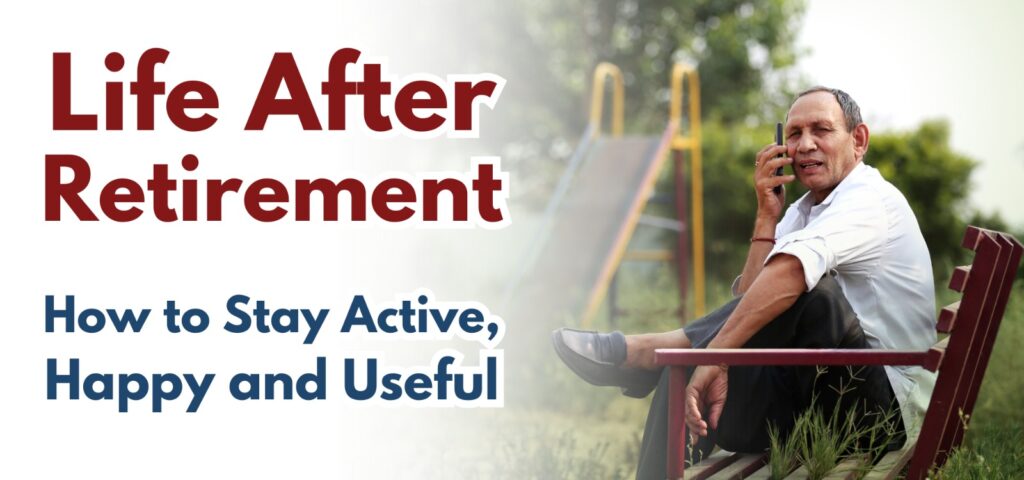Retirement is often seen as the “golden period” of life. After decades of hard work, responsibilities, and routines, you finally get the time to relax and live on your own terms. Yet, for many people, this transition can feel overwhelming. Questions like “What now?” or “How do I remain useful?” often surface. Finding ways to remain engaged, purposeful, and happy is the key to truly enjoying this phase.
Life after retirement doesn’t have to mean slowing down. In fact, this stage can open up opportunities to explore hobbies, nurture relationships, and give back to society in meaningful ways. The real challenge lies in staying active, maintaining physical and mental health, and ensuring that retirement years are both fulfilling and productive.
This article explores practical strategies to stay active, happy, and useful post-retirement. With references from Dr. Prasun’s book on lifestyle and successful ageing, you’ll discover actionable insights for living a vibrant retired life.
Maintain The Life After Retirement : Let’s Break It Down
1. The Importance of Staying Active After Retirement
a) Physical Activity Keeps You Independent
As Dr. Prasun points out, successful ageing requires maintaining physical mobility and functional strength. Exercise plays a critical role in preventing age-related decline. Walking, yoga, and light strength training not only keep the body strong but also boost mood and energy.
b) Mental Stimulation Matters Too
Staying active doesn’t just mean moving your body. Reading, solving puzzles, learning a new language, or even using technology helps keep the brain sharp. Cognitive engagement reduces the risk of memory loss and dementia.
c) Small Daily Routines Add Up
- Morning stretches or yoga
- Gardening and household chores
- A short evening walk with friends
2. Finding Happiness in the Retirement Years
a) Pursuing Hobbies
Retirement is the perfect time to rediscover passions. Painting, music, writing, or even cooking can be therapeutic. Dr. Prasun highlights that engaging in hobbies provides a sense of accomplishment and joy, which is vital for life satisfaction.
b) Building Social Connections
Loneliness is one of the biggest threats in old age. Staying connected with family, neighbors, or community groups fosters happiness. Regular meetups, group activities, and volunteering create a support system that keeps retirees emotionally strong.
c) Practicing Mindfulness and Gratitude
Daily meditation, journaling, or practicing gratitude improves mental resilience. Even a few minutes of mindfulness can reduce stress and improve overall happiness.
3. Staying Useful: The Key to Purposeful Living
a) Sharing Knowledge and Mentorship
Retirement does not mean the end of productivity. Sharing wisdom with younger generations, mentoring professionals, or offering guidance in community projects makes retirees feel purposeful. Dr. Prasun emphasizes that “a sense of usefulness is central to successful ageing.”
b) Volunteering and Social Work
Many retired individuals find meaning in giving back. Teaching children, working with charities, or helping in local initiatives adds structure and value to daily life.
c) Lifelong Learning
Enrolling in online courses, attending workshops, or joining reading clubs helps retirees stay intellectually engaged while building a sense of achievement.
4. Balancing Health, Happiness, and Usefulness
a) Physical Well-Being
- Eat balanced, nutrient-rich meals
- Stay hydrated
- Prioritize sleep for better recovery
b) Emotional Well-Being
- Maintain a positive routine
- Limit stress and unnecessary worries
- Practice laughter therapy and lightheartedness
c) Spiritual and Social Well-Being
Dr. Prasun explains that spirituality, whether through religion, meditation, or personal reflection, provides peace of mind. Coupled with social bonds, it strengthens resilience against isolation.
5. Lessons from Dr. Prasun’s Work on Successful Ageing
In his book, Dr. Prasun underscores the idea that successful ageing is not just about living longer—it is about living better. His framework integrates:
- Active lifestyle: Movement to sustain independence
- Social engagement: Staying connected to avoid loneliness
- Purposeful living: Finding ways to contribute and remain useful
He stresses that retirees should not withdraw but reinvent themselves with roles that suit their physical and emotional capacities. This philosophy encourages a vibrant life after retirement.
Conclusion
Life after retirement is not the end of productivity or happiness—it’s the beginning of a new chapter. By staying active, pursuing hobbies, connecting socially, and giving back to society, retirees can lead meaningful lives. Following insights from Dr. Prasun’s approach to successful ageing, one learns that being active, happy, and useful is not just possible but vital for thriving in the later years.
Instead of viewing retirement as an ending, it should be embraced as a chance to grow, explore, and contribute in new ways. Small daily efforts, whether through physical activity, social engagement, or learning, can make these years some of the most fulfilling.

